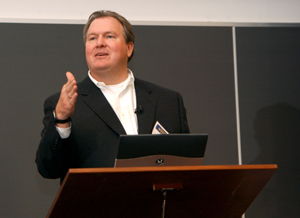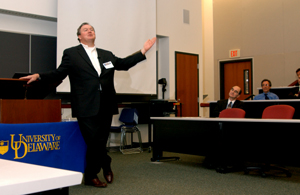11:55 a.m., Nov. 19, 2002--UD students had an opportunity to talk with one of the nation’s most successful entrepreneurs, when Richard Vague, co-founder and CEO of Juniper Financial and co-founder and former president and CEO of First USA, delivered the College of Business and Economics second Chaplin Tyler Executive Leadership Lecture.
 |
| “Most businesses don’t invest enough in the process of hiring. We do a lot of testing and invest heavily in hiring the right people,” Juniper Financial CEO Richard Vague said. |
Vague spoke in MBNA Hall, Friday, Nov. 15, detailing the health of and philosophy behind Juniper, an all-Internet bank, his latest credit card company venture.
Vague said Juniper came to fruition in 2000, after he completed his search for just the right people. Nine of the 11 executives who started Juniper were from First USA, American Express, J.P. Morgan, Wells Fargo, BankOne and Morgan Stanley, and all had years of experience and success.
Because the concept of an all-Internet bank was a new one, Vague said, they started fresh using cutting-edge technology, marketing and management, no “outdated legacy systems.” By 2001, Juniper’s loan portfolio had increased by 166 percent and the company ranked third in the industry, he said.
Juniper, strictly a credit card provider at the outset, was built on three premises, he said—partnerships, advanced technology and customer service.
Juniper partnered with the travel industry to target the business community. People who travel frequently were enticed to use Juniper because the card offered frequent flyer points and other travel amenities. The bank used the most advanced database systems and modeling tools and made customer service its highest priority.
Vague said he developed the idea for Juniper in 1995 when First USA and AOL introduced the Internet credit card. He said they had no idea what would happen when they first “switched it on,” but the bank was flooded with applications within the first hour, most from people who were extremely credit worthy and with incomes over $100,000. By 1999, AOL and First USA had 1.5 million accounts.
With his success at First USA and a strong business plan, Vague felt they’d have no trouble financing Juniper. He was right. By August 2000, they had $75 million in working capital. “Our vision was to offer wireless banking, a full line of all Internet bank accounts,” he said.
 |
| When a student asked him the secret of his success, Vague said, “Good fortune is the single biggest element of where I am today.” |
After completing his prepared speech, Vague took questions.
When a student asked him the secret of his success, Vague said, “Good fortune is the single biggest element of where I am today.” He attributed his successes to luck and the ability to get things done. “The world’s divided between people who get things done, and people who don’t.”
Vague said that carries through to his employees. “People are all- important.” Vague said he hires people who will follow through and who are innovative. “Most businesses don’t invest enough in the process of hiring. We do a lot of testing and invest heavily in hiring the right people.”
Article by Barbara Garrison
Photo by Kathy Flickinger
|

